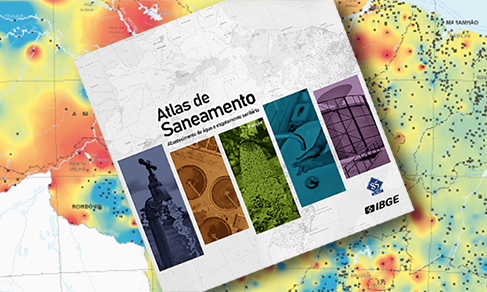Nossos serviços estão apresentando instabilidade no momento. Algumas informações podem não estar disponíveis.
Sanitation Atlas
About the publication - 2011
The deep regional inequalities that exist in the sanitation infrastructure make the universalization and development of services such as water supply, sanitary sewage, urban cleaning, garbage cleaning and urban drainage a goal to yet be achieved, even nowadays, by the State and earned by the Brazilian society.
The path of sanitation surveys in the IBGE, which starts with an initial approach restricted to the economic field, advancing later into social statistics to reach territorial and environmental issues, to some extent, followed up the evolution of its understanding as a complex aspect that require a geographic and, consequently, integrative comprehension of the relationship between society and nature, which affect the Brazilian population’s daily life, especially of those that live in the main urban centers of the country. The sanitary issue can neither be considered in a homogeneous way nor in a linear way in the entire national territory. On the contrary, it requires a coherent approach, considering the environmental and social diversity that affect, dynamically, the very understanding of this aspect as an answer matching the many demographic, social, political and environmental realities that exist in the vast national territory.
By collecting information from the 2008 National Survey of Basic Sanitation – PNSB, carried out in partnership with the Ministry of Cities, as well as from the 2010 Population Census statistics and from other sources, such as agencies and organization, this Atlas provides a wide approach on the subject, highlighting not only the space distribution, quality and efficiency of the network and services provided in the country, but also giving information about the relationship between the basic sanitation and the environmental preservation and the population’s quality of life.
Furthermore, it presents the spatialization of some subject matters organized by river basins, which is important for the understanding of the impact made by the types of occupation and use of the territory and water resources. Maps, analytical texts, charts, tables and pictures, along with a glossary with relevant expressions and definitions, make it easier for the reader to have an integrated comprehension of the subject matters addressed.
Learn more - 2011
Downloads
News and Releases
Sanitation atlas spatializes data on the environment and health
Despite the advance in the control of Diseases Related to Poor Environmental Sanitation (DRSAI), they...
24/11/2021
FAQ
What is the Sanitation Atlas?
The Sanitation Atlas provides updated information about sanitation by means of a geographic interpretation of the statistics presented in the National Survey of Basic Sanitation – PNSB. The publication marks the commitment of the Brazilian Institute of Geography and Statistics – IBGE in providing updated information about a key subject of the public health agenda, of sustainability, and of citizenship in the Brazilian society itself. The Sanitation issue, which encompasses a wide range of actions aiming to control environmental conditions and to prevent the diffusion of pathogenic vectors in areas of high population density, requires a multidisciplinary and multiscale approach that can handle the thematic interrelations that have to do with the spatial analysis. This way, the Atlas reinforces the belief that statistical information has its interpretative capacity strengthened, in the complex reality of the contemporary world, when it comes to the territorial approach provided by geography.
What is the National Survey of Basic Sanitation?
The National Survey of Basic Sanitation is mainly intended to investigate the conditions of basic sanitation services in the country, considering municipal governments and companies hired to render this kind of service in the Brazilian municipalities. This investigation, of national coverage, aims not only at the evaluation of the supply and quality of services rendered but also intends to analyze environmental conditions and their direct impact on the Brazilian population’s health and quality of life.
Your question was not answered here?
Please contact us through our service channels.




